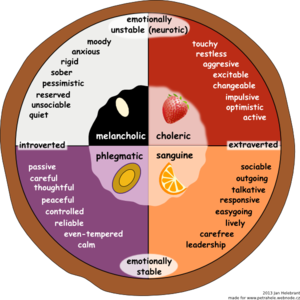Temperament and Character
Some years ago, Time magazine came out with the thought-provoking cover “Does Temperament Matter?”
At the time Barack Obama and John McCain were competing for the presidency of the USA so it was a question of great significance. How interesting that in 2016 we raised the exact same question again – the only difference being that the contestants were different!
 At the time, both Hilary Clinton and Donald Trump were openly accusing on one another of not having the temperament to take on the responsibilities of the presidency. And now with Donald Trump as president there is continual discussion about his temperament.
At the time, both Hilary Clinton and Donald Trump were openly accusing on one another of not having the temperament to take on the responsibilities of the presidency. And now with Donald Trump as president there is continual discussion about his temperament.
Which of course begs the question once again how important is temperament? Does temperament really matter? Of course, temperament matters – enormously. Temperament is all-important for presidential candidates, politicians and leaders of all types.

But then it’s just as important for each and every one of us too. Temperament guides our thinking; it affects our attitudes to life and it influences our actions. It affects our moods, our relationships and our social interactions. How much more important can it be?
An Ancient View of Temperament and Body Fluids

An awareness of the importance of temperament goes as far back as the ancient Greeks when the physician Hippocrates claimed that there were four types of temperament or “humours” based on body fluids.
These were yellow bile, phlegm, blood and black bile. An excess of any of these fluids was said to directly affect the temperament.
Just a theory of course, but it was so completely accepted that it lasted till well beyond the middle ages and even entered into our daily language. Accordingly, you could be unpleasant and bilious or calm and phlegmatic, optimistic and sanguine or like Churchill suffer from black melancholia.
The Difference between Temperament and Character.
You may have noticed how the words temperament and character are often bandied about loosely. Even a historian interviewed in the Time article I just mentioned stated: “We’re getting a little mixed up with character and temperament. They’re really hard to distinguish…”
So yes, they can be a little confusing. But when you consider it carefully, the difference between them is really quite marked. And it is a difference that is very important to graphologists.
Temperament has to do with your response to an emotional situation. You react to your feelings in a way that is in accordance with the type of temperament that you have. So if you have a volatile, excitable temperament and you have just been fired by your boss you’ll get angry, fretful and agitated. You certainly won’t take it calmly.
On the other hand, if you have a calm temperament, you’ll react with more composure. You’ll certainly feel depressed and worried but you won’t throw all your toys out of the cot. In either of these situations, your temperament will dictate how you’ll respond to an emotionally charged situation.
Temperament is inborn but character is created
Character is not about your reaction to your feelings; rather it is a built-in judgement which you have acquired as a result of your life’s experiences. These experiences have conditioned you to behave in a certain way.
The fact is that you can only develop character through the accumulation of your life’s experiences. That is why a very young child cannot have character. A child has temperament. Character develops later when the child has learnt how to deal with difficulties.
Character is about Strength
Character is about the strength of your personality built up over time from the failures and successes in your life and how these in turn affect your judgement. Character is not revealed in your first reaction to a crisis but in your considered judgement concerning that particular situation. When you can react to the difficult circumstances in your life with strength – then you have character.
That is why we refer to strength of character and not to strength of temperament.
So when people refer to the temperaments of politicians such as Trump or Clinton it is about how they react emotionally. Their characters are mostly tested by the judgement that they bring to bear in a crisis.
The Signatures of Trump and Clinton
So for the graphologists among you – what can you see about the temperaments of Trump and Clinton from their handwriting?
Clearly, Hillary’s signature shows a more measured restraint and calculation with regard to her emotional responses while Donald Trump is quicker on the draw. Of course you already knew that.
But if you want some proof, here it is in black and white:


Don’t you think these signatures speak volumes? They really don’t need much explanation! But feel free to add your comments.
Join me at The Graphology Review to get more free articles like this straight to your inbox:







Comments